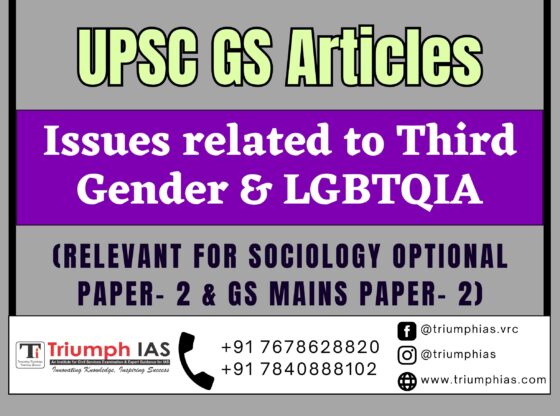Issues related to Third Gender & LGBTQIA
Relevant for sociology optional Paper- 2 & GS Mains Paper- 2

In recent years, there has been a growing recognition of the existence of a third gender, and the LGBTQIA+ community in India. This has led to a greater focus on issues related to gender and sexuality, and the need for inclusive policies that can address the challenges faced by these communities. However, despite some progress, there are still many issues that need to be addressed to ensure equal rights and opportunities for all individuals regardless of their gender identity or sexual orientation.
The term ‘third gender’ is used to refer to individuals who do not identify as male or female. In India, the Supreme Court recognized the existence of a third gender in 2014, and ordered that individuals be allowed to self-identify as either male, female or as a third gender on official documents. This was a significant step forward, as it recognized the existence of a group of people who had previously been marginalized and ignored by society.
However, despite this recognition, there are still many challenges faced by individuals who identify as third gender. For example, many individuals who identify as third gender face discrimination in areas such as education, employment, and healthcare. They may also face harassment and violence, both from individuals and from institutions such as the police.
One reason for this discrimination is a lack of understanding and awareness about the existence and rights of third gender individuals. Many people continue to hold traditional beliefs about gender and sexuality, and may view third gender individuals as ‘abnormal’ or ‘deviant’. This can lead to stigmatization and discrimination, and can make it difficult for individuals who identify as third gender to access basic services and opportunities.
The LGBTQIA+ community faces similar challenges, and often faces even greater discrimination and marginalization. The acronym stands for lesbian, gay, bisexual, transgender, queer/questioning, intersex, and asexual/aromantic. Members of this community may face discrimination in many areas, including employment, education, healthcare, and housing. They may also face harassment and violence, and may be ostracized by their families and communities.
One of the main reasons for this discrimination is a lack of legal protections and recognition. India still has laws that criminalize homosexuality, although these laws are rarely enforced. The lack of legal protections for LGBTQIA+ individuals makes it difficult for them to assert their rights and access basic services and opportunities.
Another reason for discrimination is a lack of awareness and education about LGBTQIA+ issues. Many people still view homosexuality as a moral or religious issue, rather than a matter of personal identity and choice. This can lead to stigmatization and discrimination, and can make it difficult for LGBTQIA+ individuals to live openly and freely.
However, there have been some positive developments in recent years. In 2018, the Indian Supreme Court struck down a colonial-era law that criminalized homosexuality. This was a significant step forward, and has helped to pave the way for greater legal recognition and protections for LGBTQIA+ individuals.
There have also been efforts to increase awareness and education about LGBTQIA+ issues. For example, some schools and universities are now including LGBTQIA+ issues in their curricula, and there have been campaigns to raise awareness about the challenges faced by LGBTQIA+ individuals.
Despite these positive developments, there is still much work to be done to ensure equal rights and opportunities for all individuals regardless of their gender identity or sexual orientation. Some of the key issues that need to be addressed include:
- Legal protections: There is a need for greater legal recognition and protections for third gender and LGBTQIA+ individuals. This includes protection against discrimination in areas such as education, employment, and healthcare, as well as the recognition of same-sex marriage and adoption.
- Awareness and education: There is a need for greater awareness and education about third gender and LGBTQIA+ issues. This includes educating the general public, healthcare providers, and other professionals about the challenges faced by third gender and LGBTQIA+ individuals, as well as the importance of respecting their rights and identities. It also involves creating safe spaces and support systems for these communities, and promoting positive representation in media and popular culture.
- Healthcare: There is a need for healthcare providers to be more aware and knowledgeable about the specific healthcare needs of third gender and LGBTQIA+ individuals. This includes providing gender-affirming healthcare, mental health support, and addressing issues related to HIV/AIDS and other sexually transmitted infections.
- Employment: There is a need for policies and practices that promote equality and non-discrimination in the workplace. This includes ensuring that individuals are not discriminated against based on their gender identity or sexual orientation, and providing equal opportunities for advancement and training.
- Violence and harassment: There is a need to address the issue of violence and harassment faced by third gender and LGBTQIA+ individuals. This includes ensuring that perpetrators are held accountable for their actions, and providing support and resources for survivors.
In conclusion, there are many challenges facing third gender and LGBTQIA+ individuals in India, including discrimination, marginalization, and violence. However, there have been some positive developments in recent years, including the recognition of a third gender and the decriminalization of homosexuality. To ensure equal rights and opportunities for all individuals, there is a need for greater legal protections, awareness and education, healthcare, employment policies, and addressing violence and harassment. By working together to address these issues, we can create a more inclusive and just society for all.
For more such free UPSC notes, Articles, News & Views Join our Telegram Channel. https://t.me/triumphias
Click the link below to see the details about the UPSC – Civils courses offered by Triumph IAS. https://triumphias.com/pages-all-courses.php


